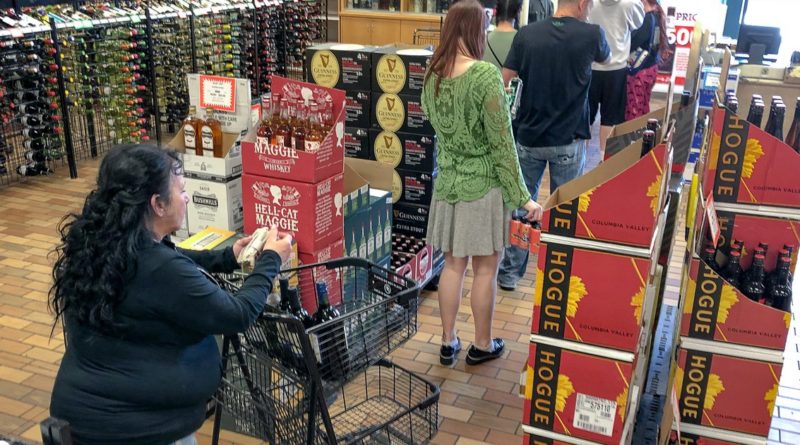Corona virus: What are the Advantages and Disadvantages of Online Liquor Sales?
On 25 March, the liquor shops closed across the country, then again opened on 4 May. Did the shops not bother to get open liquor? They should not be deterred from having long queues.
In the third phase of the lockdown, as soon as the central government lifted the ban on the sale of liquor, small towns from Delhi, Mumbai and Kolkata also saw queues of one to two kilometers to buy liquor. Even in Nainital district of Uttarakhand, people remained in the queue amid heavy rains.
Long queues of people on the one hand can cause the rise of the Corona Transition figures for the state governments, on the other hand, these lines are also looking as the only means to revive the economy of the state.
However, in the first phase of the lockdown (March 25-April 14), Assam, Meghalaya, West Bengal, Kerala and Punjab opened some liquor shops with strict guidelines as the central government did not issue any clear guidelines on the sale of liquor at that time. Later, the central government forbade these states to do so.
On 15 April, the Center had explicitly issued a ban on the sale of liquor by issuing guidelines, which has now been removed in the third phase of lockdown.
Bihar, Gujarat, Nagaland, Mizoram and Union Territory of Lakshadweep; except for these states where liquor is banned, excise duty on liquor is a strong source of earning for other states.
According to the RBI’s research on state finances (2019-20) report, 10-15 per cent of the state’s own tax revenue comes from excise duty on alcohol.
After lifting the ban from May 4, Karnataka earned close to Rs 70 crore and Uttar Pradesh earned up to Rs 100 crore.
An official working as Additional Commissioner in the Department of Central Excise (Central Excise) told the BBC that the tax related to liquor also gets the benefit of the state governments and the central government does not interfere.
The custom tax levied on the import of foreign liquor goes to the central government’s account and the tax levied on the sale of it goes to the state government. They also say that due to non-implementation of GST on liquor, the state government earns a good profit.
In such a situation, when the liquor is to be sold, what is the maximum use of online service in the states to avoid congestion during the Corona period?
Chhattisgarh started online liquor sales and home delivery in the green zone on May 5. Punjab has not released its online service but is considering home delivery in the Orange and Green zones. But how effective is this formula?
What does the law on online liquor sales say?
According to the Seventh Schedule of the Indian Constitution, the state government can make laws related to the sale of liquor.
According to Delhi High Court senior advocate Roop Chand Tiwari, every state government has made rules regarding the sale of liquor online according to itself, somewhere it is banned and somewhere there is no mention of this option in the act.
If we talk about the age of drinking alcohol, then that too is different in every state; Like it is 25 years in Delhi, 18 years in Goa, Karnataka and 23 years in Kerala.
He explains that “Since India is currently dealing with the global disaster caused by the corona virus, due to this, rules or laws can be changed under the Disaster Management Act 2005, Epidemic Disease Act 1897 to save people from disaster.” As Chhattisgarh did, so can other states. “
Roop Chand says that currently according to the Delhi Excise Act, 2009, online sale of alcohol is banned. Delhi government can start online sales for some time by using Epidemic Diseases Act 1897 and Delhi Epidemic Diseases Covid-19 Regulations, 2020.
One advocate of the Delhi High Court believes that due to the Corona disaster, the state governments can start selling liquor online by passing an ordinance, but it has to be implemented carefully so that no one smuggles it by taking advantage of this opportunity.
He says that recently a citizen of Kerala had filed a petition for home delivery of liquor in the Kerala High Court, which the court rejected and said that the government can take it, not the court.
What is the opinion of liquor contractors?
A Delhi liquor shopkeeper told the BBC on the condition of keeping his identity secret that there are more than 700 liquor shops in Delhi including government and private shops and only 75-100 shops have been opened at this time.
Demand is high but supply is doing only few shops. This can cause trouble that if there is a shortage of stock in these shops, then the crowd can dominate the shopkeepers.
He also said that “Delhi government has opened only L-6 and L-8 licensed shops which are run by the government. There is not much stock in these shops. “
He says “starting an online service can be a good option. Stock can be sold online from the retail vendor. “
An officer working in the excise department of Uttar Pradesh told a news channel on condition of anonymity that there is no service like online liquor sales in Uttar Pradesh. Sale continues at licensed retail shops here.
Home delivery is being done through retail shops in West Bengal but online liquor sales have their own disadvantages.
Disadvantages of Online Liquor Sales
A senior lawyer of Delhi High Court says that it can be difficult to assess the age in online service.
Since there is no such provision in the online system, it can be ascertained that the person ordering the liquor is younger in age or has reached the legal age of drinking alcohol.
Referring to a case in Karnataka, he says, ‘Hip Bar’, an online liquor vendor company, started its operations in Chennai city of Tamil Nadu in 2015. After this, in 2017, he started his service in Bengaluru city of Karnataka. But in the year 2019, the Karnataka government had canceled the service of ‘Hip Bar’ in its state, saying that age is not known in online liquor sales and it is dangerous.
Hip Bar owner Prasanna Natarajan had argued that work could be done on the Aadhaar card based process, so that the age can be known.
Along with this, he also explains that because every state government has its own rules for the sale of liquor, getting an online license from it is a big challenge in itself.
The most important thing is that people can use it for smuggling liquor by using it wrongly. The amount of tax revenue that the state government gets will also not be properly assessed.
Online alcohol sales may increase corona infection?
While beginning online service or home delivery of alcohol for some time, some states are trying to prevent corona infection from increasing by controlling congestion. But how will this affect the health of drinkers?
Can drinking alcohol increase the risk of corona infection on the drinker? With the introduction of online service, there will be more alcohol consumption because people will be able to order liquor while sitting at home.
According to the World Health Organization’s ‘Global Status Report on Alcohol and Health’, about 32 percent of people in India drink alcohol, of which more than half of them drink at dangerous levels, that is, they drink more than they need. In such a situation, the consumption of alcohol can lead to many diseases.
Drinking alcohol increases the risk of disease, due to which the immunity of the disease decreases.
The World Health Organization released guidelines to make aware that even though drinking alcohol has not directly confirmed to be Covid-19, but alcohol affects your immunity, so it should be avoided.
According to the news of ANI, a group of women in Madurai district of Tamil Nadu came out and took to the streets against the state government’s decision to open liquor contracts. According to her, her husband commits domestic violence after consuming alcohol. Officials working in the central excise department say that by increasing taxes on the sale of liquor by many states, money can be earned, but at the same time there may be control over the sale.




